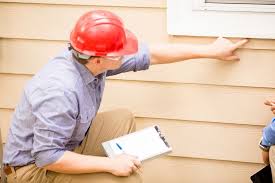Choosing the right home inspector is one of the most crucial steps in the home buying process. A home inspection helps you identify potential issues with a property before you commit to purchasing it. This guide will help you navigate the process of selecting the right home inspector for your property.
Why Choosing the Right Home Inspector is Important
When purchasing a home, whether it’s your first or an investment property, ensuring the structure and systems are in good condition is vital. A professional home inspector provides you with a thorough, unbiased assessment of the home’s condition. A skilled inspector can uncover hidden issues such as electrical faults, plumbing problems, or foundation issues that could cost you a fortune to repair later.
Qualifications and Certifications: What to Look For
Before hiring a home inspector, check their qualifications and certifications. Ensure the inspector is licensed and certified by a recognized professional organization such as the American Society of Home Inspectors (ASHI) or National Association of Home Inspectors (NAHI). These organizations ensure their members meet industry standards and maintain ethical practices.
Why Certifications Matter
A certified Home Inspections has passed rigorous tests and has the necessary knowledge to identify issues in a home. These certifications not only signify competence but also show the inspector’s commitment to keeping up with industry best practices.
Experience Matters: The Value of an Experienced Inspector
An experienced home inspector is better equipped to identify subtle issues that might be overlooked by less experienced professionals. Look for an inspector who has several years of experience and has completed numerous inspections. They are more likely to have a keen eye for problems that may not be immediately visible.
Specialization in Property Type
If you’re buying a specialized property, such as a historic home or a condo, look for an inspector who has experience with that specific type of property. Specialization ensures they understand the unique challenges associated with these properties.
Reviews and Recommendations: How to Find a Trusted Inspector
Word of mouth can be a powerful tool when looking for a reliable home inspector. Ask your real estate agent, friends, or family for recommendations. You can also check online reviews and ratings on platforms like Google or Yelp to get an idea of the inspector’s reputation.
Red Flags to Watch For
Be wary of any inspector who discourages you from attending the inspection or refuses to provide a sample report. These are potential red flags that could signal a lack of professionalism or transparency.
What’s Included in the Inspection Report?
Make sure the home inspector provides a comprehensive written report that covers all major systems of the home, such as:
- Roof: Inspecting for leaks, damage, and overall condition.
- Foundation: Checking for cracks, settling, or other structural issues.
- Electrical Systems: Ensuring that the electrical wiring and systems are safe and functioning.
- Plumbing: Examining pipes, water pressure, and potential leaks.
A good inspector will provide a detailed, easy-to-read report that helps you understand the condition of the property.
Cost of a Home Inspection: What to Expect
Home inspection costs can vary depending on the size of the property, location, and the inspector’s experience. On average, expect to pay between $300 to $500 for a standard home inspection. Keep in mind that while a cheap inspector might seem appealing, cutting corners can lead to missed issues that could cost you more in the long run.
Negotiating the Fee
Some inspectors may be willing to negotiate their fees, especially if they are highly recommended or you’re purchasing multiple properties. Don’t hesitate to ask about discounts, especially if you need inspections for multiple homes.
Availability and Flexibility: Scheduling the Inspection
Choose an inspector who is flexible with scheduling and can accommodate your needs. Ideally, they should be available within a few days of you making the decision to purchase a home. Waiting too long can delay your closing process and give you less time to negotiate repairs based on the inspection results.
Availability for Follow-up Questions
A great inspector will not only do the inspection but will also be available to answer any questions you have after receiving the report. Ensure that the inspector is willing to provide clarifications about any findings that may be unclear.
Questions to Ask Before Hiring a Home Inspector
Before finalizing your decision, ask these questions:
- How long have you been inspecting homes?
- Are you licensed and insured?
- Can I attend the inspection?
- What will be included in the inspection report?
- How do you handle follow-up questions?
These questions will help you gauge their experience and professionalism.
Conclusion
Selecting the right home inspector is essential for a successful home purchase. By focusing on experience, certifications, reputation, and thoroughness, you can ensure that your home inspection provides you with valuable insights into the property’s condition. Remember, this is an investment in your future, and a good inspector can help save you from costly repairs down the road.
Frequently Asked Questions (FAQs)
1. What if the home inspector misses something during the inspection?
Most inspectors provide a warranty or guarantee that covers missed issues. You can also request a re-inspection if something significant is overlooked.
2. How long does a home inspection take?
Typically, a home inspection lasts between 2-4 hours, depending on the size and condition of the home.
3. Do I need a separate inspection for pests or mold?
Home inspections typically cover visible signs of pests or mold. However, for a more thorough assessment, you may need separate inspections for these specific issues.
4. Can I negotiate the price of the home based on the inspection?
Yes, if the inspection reveals major issues, you can negotiate with the seller for repairs or a reduction in price.
5. Is it necessary to be present during the inspection?
While it’s not required, being present during the inspection allows you to ask questions and better understand the inspector’s findings.









